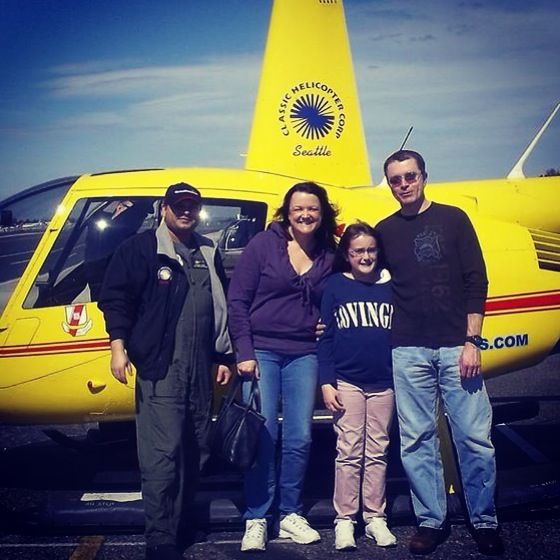Overcoming Challenges: Jules’ Story
Jules had an incredible weekend. She had her first father-daughter dance and smiled all day Saturday and Sunday. I can remember it almost seemed magical to her. She was so thrilled about spending that special time with her dad. She was in the first grade. As I tucked her into bed that Sunday night, she started to cry. I closed her door because her dad and sister had to get up for work and school the next day. I sat down on her bed to comfort her. She couldn’t tell me what was wrong, but the tears turned to hysterical crying and she began begging me to kill her. This went on for a few hours. I was in complete shock and had no idea what to do. I kept telling her how much we all loved her and how our lives would never be the same if she was gone.
At some point in the night she woke her dad up. I remember the confused look on his face when he came in the room. She explained that my tears were tears of happiness because we all knew it was best for her to die. The three of us sat in her bed with her until around 4 a.m. that night before she finally passed out, exhausted from crying.
This was when I knew that something was very wrong. My husband and I were in shock. Our precious, funny and happy little girl was traumatized and we had no idea why. We had no idea what to do. What had happened?
With less than an hour of sleep, we were exhausted physically and emotionally. We had no idea what we were dealing with and knew we needed help. Luckily, we were able to get her to see an incredible psychiatrist at Seattle Children’s Hospital, a few hours after Jules woke up. I pushed through my own panic. I hoped it was a dream… that somehow she’d wake up and it all would be OK. But the whole breakdown started again. She begged to at least be hospitalized if we wouldn’t agree to kill her. Words nobody ever wants to hear from their child. This was her first of three visits to the psych unit.
We worried that the stay at the inpatient psychiatric unit might possibly do more harm than good. We sat in the room, never leaving her side, listening to kids bang chairs against the doors, screaming and moaning. We slept on the floor or in chairs just hoping she would get better. Each time we left she was stable, but something still wasn’t right.
In the years following this event, our sweet Jules has been diagnosed with what seems like every possible diagnosis. I counted 12 in the paperwork I glanced through before writing this. Scary words like bipolar, schizophrenia, psychotic disorder, etc. We couldn’t escape those haunting words or those haunting moments. I felt desperate. Even after being stabilized, Jules struggled to fit in at school. She felt different than all of the other kids. Her medicine made her overweight. Her tummy became distended – so much that kids and adults would ask her if she was pregnant. We felt out of control and so deeply worried.
Facing Her Fears
In 2008 we found a psychologist that specialized in Obsessive Compulsive Disorder (OCD). He taught her that she was going to have to work harder than the average person to overcome her fear of literally everything. She made a list of things she wanted to try to prove to herself that she was strong. I, too, had to work hard as every instinct in my body wanted to protect her, to keep her in a bubble away from all of her fears.
Jules faced her challenges with a kind of courage that most adults don’t possess. Part of dealing with her OCD meant facing all of her fears. She went on a helicopter ride, rode every ride at the fair, zip lined and repelled, even stayed at overnight camp for a week twice. She wanted to jump out of an airplane; however, it’s against the law for someone under 18, (which I honestly was ok with). This was coming from a girl who was afraid to dance in fear of sliding into a piano and breaking her leg. She was making great progress, but something else was still wrong.
Last fall we put Jules through another round of evaluation, this time with full testing. That’s when we learned that it took the average child with mental health issues six years to be properly diagnosed. That was how long it took us to get her diagnosed. She went from a child who would not leave the house, was afraid of everyone she saw, of every thought she had, to an empowered 13-year-old with high functioning autism, OCD and major depressive disorder. She knows that she is different than other kids with “typical brains” but is OK with it. She likes her atypical brain and says it makes her an out of the box thinker. She has learned to ignore the kids who don’t understand her, and has a great group of family and friends that love her quirky sense of humor and unique view of the world.
Looking back I think the biggest roadblock we have had with Jules’ whole journey has been the struggle of finding the correct diagnosis. I look at the time that was wasted. I was told recently that Washington state schools do not have an obligation to meet her sensory needs due to her age now, but if she had had her high functioning autism diagnosis back in elementary school, she could have had occupational therapy services for it for years. She has worked so hard and has come so far and I couldn’t be prouder, but a proper diagnosis could have made the road a lot less bumpy for us all.



